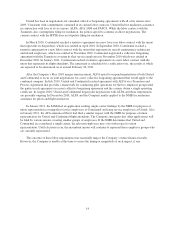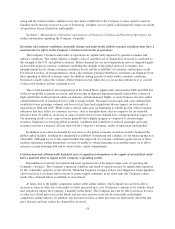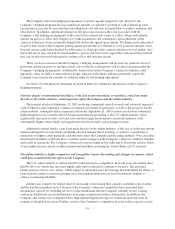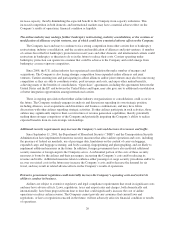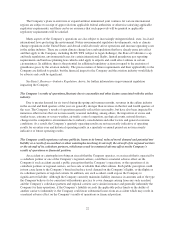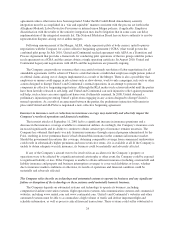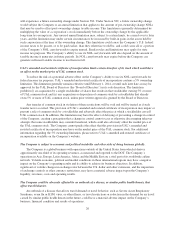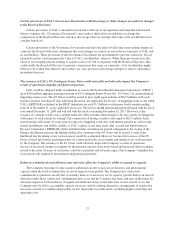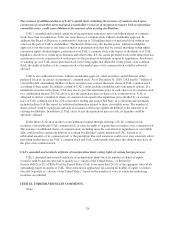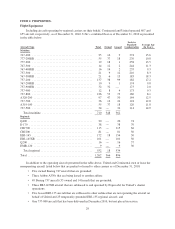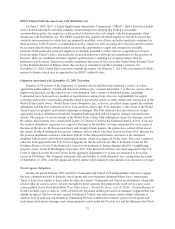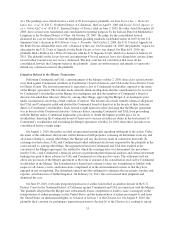United Airlines 2010 Annual Report Download - page 26
Download and view the complete annual report
Please find page 26 of the 2010 United Airlines annual report below. You can navigate through the pages in the report by either clicking on the pages listed below, or by using the keyword search tool below to find specific information within the annual report.agreements unless other terms have been negotiated. Under the McCaskill-Bond Amendment,seniority
integration must be accomplished in a “fair and equitable” manner consistent with the process set forth in the
Allegheny-Mohawk Labor Protective Provisions or internal union Merger policies, if applicable. Employee
dissatisfaction with the results of the seniority integration may lead to litigation that in some cases can delay
implementation of the integrated seniority list. The National Mediation Board has exclusive authority to resolve
representation disputes arising out of airline mergers.
Following announcement of the Merger, ALPA, which represents pilots at both carriers, opted to pursue
negotiations with the Company for a joint collective bargaining agreement (“JCBA”) that would govern the
combined pilot group. In July 2010, United and Continental reached agreement with ALPA on a Transition and
Process Agreement that provides a framework for conducting pilot operations of the two groups until the parties
reach agreement on a JCBA and the carriers obtain a single operating certificate. In August 2010, United and
Continental began joint negotiations with ALPA and the negotiations are presently ongoing.
The Company can provide no assurance that a successful or timely resolution of labor negotiations for all
amendable agreements will be achieved. There is a risk that unions or individual employees might pursue judicial
or arbitral claims arising out of changes implemented as a result of the Merger. There is also a possibility that
employees or unions could engage in job actions such as slow-downs, work-to-rule campaigns, sick-outs or other
actions designed to disrupt United’s and Continental’s normal operations, in an attempt to pressure the
companies in collective bargaining negotiations. Although the RLA makes such actions unlawful until the parties
have been lawfully released to self-help, and United and Continental can seek injunctive relief against premature
self-help, such actions can cause significant harm even if ultimately enjoined. In 2008, United obtained a
preliminary injunction preventing United’s pilots from engaging in any actions designed to disrupt United’s
normal operations. As a result of an agreement between the parties, the preliminary injunction will remain in
place until United and ALPA have negotiated a new collective bargaining agreement.
Increases in insurance costs or reductions in insurance coverage may materially and adversely impact the
Company’s results of operations and financial condition.
The terrorist attacks of September 11, 2001 led to a significant increase in insurance premiums and a
decrease in the insurance coverage available to commercial airlines. Accordingly, the Company’s insurance costs
increased significantly and its ability to continue to obtain certain types of insurance remains uncertain. The
Company has obtained third-party war risk (terrorism) insurance through a special program administered by the
FAA, resulting in lower premiums than if it had obtained this insurance in the commercial insurance market.
Should the government discontinue this coverage, obtaining comparable coverage from commercial underwriters
could result in substantially higher premiums and more restrictive terms, if it is available at all. If the Company is
unable to obtain adequate war risk insurance, its business could be materially and adversely affected.
If any of the Company’s aircraft were to be involved in an accident or if the Company’s property or
operations were to be affected by a significant natural catastrophe or other event, the Company could be exposed
to significant liability or loss. If the Company is unable to obtain sufficient insurance (including aviation hull and
liability insurance and property and business interruption coverage) to cover such liabilities or losses, whether
due to insurance market conditions or otherwise, its results of operations and financial condition could be
materially and adversely affected.
The Company relies heavily on technology and automated systems to operate its business and any significant
failure or disruption of the technology or these systems could materially harm its business.
The Company depends on automated systems and technology to operate its business, including
computerized airline reservation systems, flight operations systems, telecommunication systems and commercial
websites, including www.united.com and www.continental.com. United’s and Continental’s websites and other
automated systems must be able to accommodate a high volume of traffic and deliver important flight and
schedule information, as well as process critical financial transactions. These systems could suffer substantial or
24


